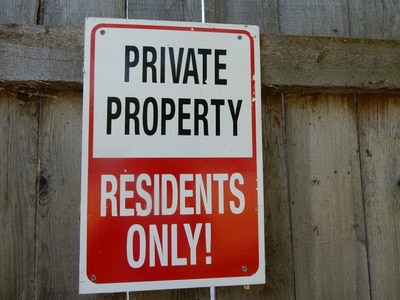A Landlord’s Guide to Right of Entry
A lot of landlords are of the opinion that because they own a property, they have an automatic right of entry without first gaining permission from the tenant. There are however clear rules and regulations that dictate when a landlord is allowed, and not allowed, to enter a property, and when tenant permission is required to do so.

A lot of landlords are of the opinion that because they own a property, they have an automatic right of entry without first gaining permission from the tenant. There are however clear rules and regulations that dictate when a landlord is allowed, and not allowed, to enter a property, and when tenant permission is required to do so.
When it comes to dealing with making visits to your tenanted property, the best approach is to adopt a flexible, reasonable attitude. Always remember that whilst it’s your property, it is also your tenants’ home.
Can a landlord enter without permission?
The general answer is no, it is not possible by law for a landlord to enter a tenanted property unless they have permission from the tenant. If a landlord does enter without permission, then the tenant will be within their rights to claim damages, or even to gain an injunction to prevent it happening again.
As specialist landlord and tenant lawyer Tessa Shepperson says, “Under the Protection from Eviction Act 1977 landlords must not do anything which could be deemed harassment, and entering a tenant’s home without asking first is a prime example of this.”
What are a landlord’s rights to enter property?
Landlords can only enter tenanted property with the tenant’s permission, and after providing a viable explanation as to why they wish to enter.
Viable reasons may be:
- To conduct a mid-term inspection
- To inspect a property to ensure it meets current safety guidelines
- To complete the annual Gas Safety Check
- To complete the required electrical safety checks and produce the EICR
- To replace any hazardous or non-functioning appliances
- To empty a fuel slot meter
- To show the property to prospective tenants
- To deal with an emergency
How much notice does a landlord have to give to enter property?
24 hours’ written notice must be given in most cases before a landlord can enter a property, and permission must be given by the tenant. Arrangements can only be made to visit at a ‘reasonable’ time of day, and every effort should be made to allow the tenants to be around during the visit.
Does a landlord have a right of entry in emergencies?
This is the exception to the 24-hour rule where landlord notice to enter is not required.
If a landlord believes there is an immediate danger to their property, for example structural damage, water escape, fire or a gas leak, or they believe a criminal is attempting to gain access or there is some other life-threatening occurrence taking place, then they are within their rights to enter the property without notice, or instruct emergency services to do so.
What if tenants refuse entry?
Tenants do actually have a right to refuse entry, but landlords retain a right of entry if they have a valid reason to do so. Tenants who refuse entry when there is a safety hazard that needs attention could well find themselves unable to make a claim should they go on to suffer an injury.
Are there different right of entry rules for shared properties or HMOs?
Yes, there are different rules when it comes to landlord access to property that is shared. Landlords are allowed to access any shared areas, such as kitchens or lounges, to undertake inspections or carry out maintenance tasks. They do not have the right however to enter any private rooms such as bedrooms without applying the 24-hour notice rule.
Are there special right of entry rules under COVID-19?
Government guidance for landlords and tenants says that unless you’re self-isolating, repairs and gas safety inspections can still go ahead. This applies during national lockdowns, and within Tier restrictions.
Landlords and contractors must all follow guidance on working safely within people’s homes. If a tenant is self-isolating, then no one should enter the property unless it’s to deal with a serious issue that is endangering their safety.
Annual gas safety checks are a legal requirement and access should be granted providing it’s safe. In other words, wait for tenants to complete any necessary period of self-isolation and for any symptoms to subside.
Non-urgent repairs can be delayed if tenants are nervous of having anyone enter the property. For example, if they are shielding, or are particularly vulnerable.
External repairs and any outdoor maintenance can be carried out. If anyone within the household is self-isolating, then no one should enter the home.
Need help with property management?
When it comes to property management, Croydon based homes2let offers a complete package. Even better, the homes2let rent guarantee scheme secures your rental payments, even during void periods.
Why not get in touch to discover how we can make your life as a landlord that bit easier, with all your legal responsibilities fully taken care of?
Related Insights

Japanese Knotweed: What Every Landlord Needs to Know
Everyone, including landlords, has a responsibility to prevent harmful, invasive plants and non-native species from spreading and causing damage to the environment and threatening livestock. This includes the infamous Japanese knotweed. Here's what the government says should be done to control and dispose of plants that have the potential to damage the environment.

The Importance of Regular Mid-term Inspections
Ensuring minor issues don’t escalate into major problems is an exercise that never fails to save landlords time and money. It’s precisely why the mid-term inspection is such a vital tool. Here’s the lowdown on mid-term inspections, why as a landlord you should be investing in them, how often you should be doing them, and what’s involved.

Can a Tenant Run a Business from a Rental Property?
With so many people now working from home due to the COVID-19 pandemic, this does of course raise the question for landlords as to whether tenants should be allowed to start running a business from a rented property. Let’s take a look at what the law says, and the important considerations every landlord needs to make when considering allowing tenants to use their home as a place of business.






